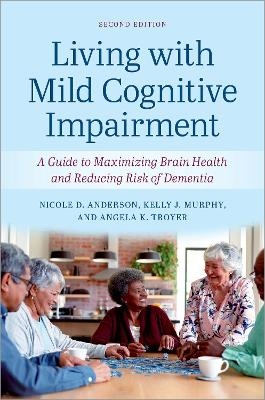
Living with Mild Cognitive Impairment
Oxford University Press Inc (Verlag)
978-0-19-774934-0 (ISBN)
This second edition contains 52 accessible chapters with a new chapter on sex differences to summarize the growing knowledge of its importance in health and treatment of MCI. As advances in research continue to evolve, this book will continue to be essential reading for those impacted by MCI.
Nicole D. Anderson is a Senior Scientist at the Rotman Research Institute, Baycrest Academy for Research and Education, and is a Professor in the Departments of Psychology and Psychiatry at the University of Toronto. Kelly J. Murphy is a Clinical Psychologist and Neuropsychologist in private practice and at Baycrest Hospital, an Assistant Professor of Psychology at the University of Toronto, and a psychology adjunct faculty member at York University and Queen's University. Angela K. Troyer is the Program Director of Neuropsychology and Cognitive Health and an Interprofessional Practice Chief at Baycrest, and is an Assistant Professor in the Department of Psychology at the University of Toronto.
Foreword
By Ron Petersen
Acknowledgments
How to Read This Book
A Story about Joe and Ruth: Part One
SECTION ONE: WHAT IS MILD COGNITIVE IMPAIRMENT AND HOW DOES IT DIFFER FROM TYPICAL AGING?
1. Memory and Aging: The Basics
2. How Memory Typically Changes with Age
3. What is Mild Cognitive Impairment?
4. Clinical Criteria for Mild Cognitive Impairment
5. How Memory Changes in Amnestic Mild Cognitive Impairment
SECTION TWO: BEYOND MILD COGNITIVE IMPAIRMENT: WHAT IS DEMENTIA?
6. What is Dementia?
7. Alzheimer's Disease
8. Vascular Dementia
9. Frontotemporal Dementia
10. Dementia of Parkinson's Disease and Lewy Body Disease
SECTION THREE: FACTORS THAT AFFECT MILD COGNITIVE IMPAIRMENT
11. What is a Risk Factor? What is Prevalence? What is Incidence?
12. Risk Factors for Mild Cognitive Impairment and Dementia That Are Not Under Your Control
13. Risk Factors for Mild Cognitive Impairment and Dementia That Are Under Your Control
14. Sex Differences in Mild Cognitive Impairment: It's Complicated
SECTION FOUR: OUTCOMES OF MILD COGNITIVE IMPAIRMENT
15. When Mild Cognitive Impairment Stays Stable or Returns to Normal
16. When Mild Cognitive Impairment Progresses to Dementia
SECTION FIVE: GETTING TO A DIAGNOSIS
17. Bringing Your Concerns About Memory Change to Your Family Doctor
18. Cognitive Screening
19. Specialists You May be Referred to
20. Neuropsychological Evaluation
SECTION SIX: TREATMENT OF MILD COGNITIVE IMPAIRMENT
21. Drug Treatment of Mild Cognitive Impairment
22. Memory Intervention Programs
23. Involvement in Research Studies
SECTION SEVEN: PERSONAL MANAGEMENT OF MILD COGNITIVE IMPAIRMENT
24. Life as a Person with Mild Cognitive Impairment
25. Life as a Person Close to Someone with Mild Cognitive Impairment
26. Stress Management and Mental Wellness
27. Sleeping Well
28. Making Change for the Better
SECTION EIGHT: PRACTICAL CONSIDERATIONS FOR LIVING WITH MILD COGNITIVE IMPAIRMENT
29. What About Driving?
30. Planning for Current and Future Support Needs
31. Legal Matters
32. Resources for Taking Charge of Mild Cognitive Impairment
SECTION NINE: MANAGING MILD COGNITIVE IMPAIRMENT THROUGH HEALTHY EATING AND EXERCISE
33. Healthy Lifestyles: How Do We Know What We Know?
34. How Diet Affects Health
35. Making Sense of the Diet Buzz
36. How to Achieve Healthy Eating Habits
37. Exercise: Jog Your Memory
38. Physical and Cognitive Benefits of Exercise
39. Exercise Your Way to Better Brain Health
40. Types of Exercise and Activities
SECTION TEN: MANAGING MILD COGNITIVE IMPAIRMENT THROUGH ENGAGEMENT
41. What is Cognitive Engagement?
42. Benefits of Cognitive Engagement
43. What is Social Engagement?
44. Benefits of Social Engagement: A Good Friend is Good for You
45. Building a More Sociable Lifestyle
SECTION ELEVEN: USING MEMORY STRATEGIES
46. An Introduction to Memory Strategies
47. Using a Memory Book
48. Good Memory Habits
49. Attention as a Memory Strategy
50. Remembering by Thinking About What Something Means
51. Repeat, Repeat, EL Repeat
52. Using Memory Strategies in Your Everyday Life
A Story about Joe and Ruth: Part Two
Bibliography
Index
| Erscheinungsdatum | 06.03.2024 |
|---|---|
| Verlagsort | New York |
| Sprache | englisch |
| Maße | 156 x 235 mm |
| Gewicht | 649 g |
| Themenwelt | Sachbuch/Ratgeber ► Gesundheit / Leben / Psychologie ► Krankheiten / Heilverfahren |
| Geisteswissenschaften ► Psychologie ► Allgemeine Psychologie | |
| Geisteswissenschaften ► Psychologie ► Biopsychologie / Neurowissenschaften | |
| Geisteswissenschaften ► Psychologie ► Klinische Psychologie | |
| Geisteswissenschaften ► Psychologie ► Verhaltenstherapie | |
| Medizin / Pharmazie ► Medizinische Fachgebiete ► Geriatrie | |
| Medizin / Pharmazie ► Medizinische Fachgebiete ► Neurologie | |
| Medizin / Pharmazie ► Physiotherapie / Ergotherapie ► Rehabilitation | |
| Sozialwissenschaften ► Pädagogik | |
| ISBN-10 | 0-19-774934-8 / 0197749348 |
| ISBN-13 | 978-0-19-774934-0 / 9780197749340 |
| Zustand | Neuware |
| Informationen gemäß Produktsicherheitsverordnung (GPSR) | |
| Haben Sie eine Frage zum Produkt? |
aus dem Bereich


